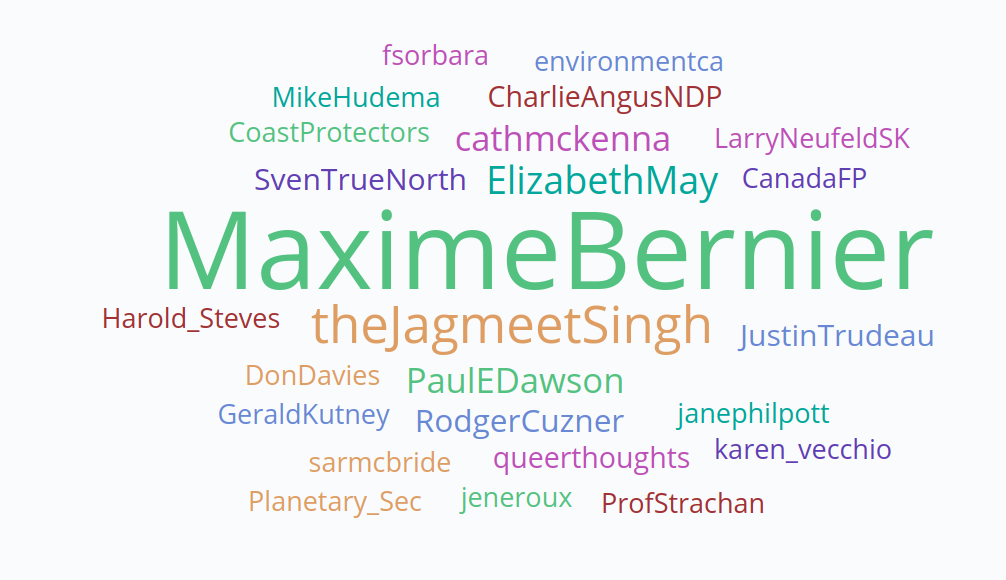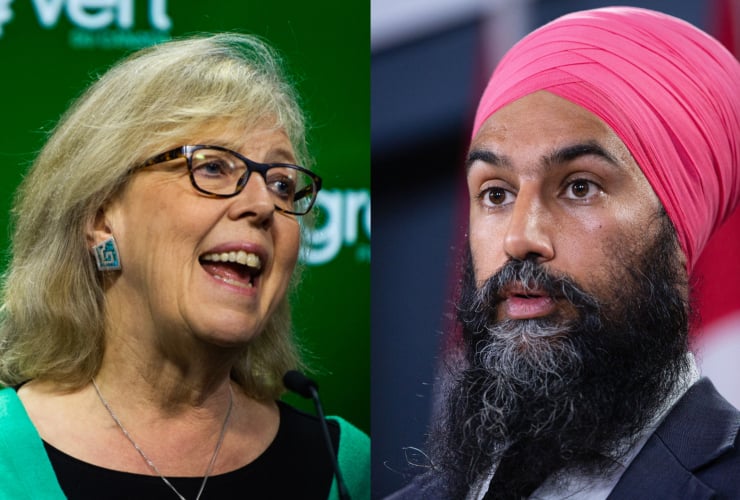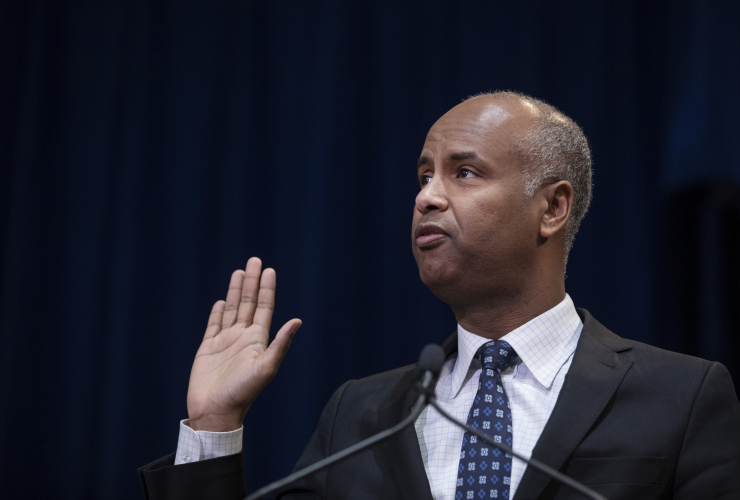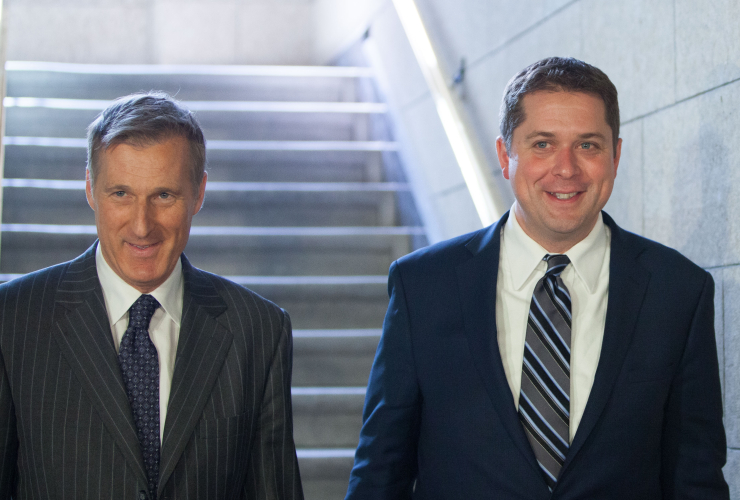Tweets from and about People’s Party of Canada (PPC) Leader Maxime Bernier are dominating the #ClimateChange discussion on Twitter, according to an analysis of political tweets from the past 90 days.
The findings highlight how easily social-media hashtags can be hijacked by small groups of accounts. This activity can ultimately derail important discussions while also amplifying extreme voices on issues like the climate crisis.
One striking example is a flood of over a thousand tweets that closely followed Bernier's well-publicized attack on climate activist Greta Thunberg.
“A 900 per cent increase in #ClimateChange tweets collected following Bernier’s attack on Greta Thunberg is more than a viral reaction,” said digital researcher Jessalyn Hernandez, who specializes in open-source intelligence and online extremism at the Terrorism Research & Analysis Consortium (TRAC).
To see what the political discussion surrounding climate change looks like on Twitter, we analyzed the past 90 days of tweets mentioning the hashtag #ClimateChange that came from members of Parliament and accounts mentioning Canadian MPs, for a total of 9,446 unique tweets.
The results describe the social-media conversation driven by that hashtag in particular, and doesn't include tweets that only include keywords like "climate change" or "climate crisis." Data were streamed through Twitter’s API, indexed using Elasticsearch and visualized using Kibana.
Bernier dominates #ClimateChange discussion
Overall, the hashtag was used about 100 to 200 times a day among this group of users, but there were two significant spikes in activity when daily uses of the hashtag spiked to about 1,000.
The first spike in activity was recorded on Aug. 19, just after Elections Canada announced that ads declaring climate change is real and suggesting solutions could be considered partisan since some political candidates have publicly expressed doubts about the existence of climate change.
The second spike in activity was recorded from Aug. 31 to Sept. 2, with a peak of more than 1,500 #ClimateChange tweets right after Bernier attacked Thunberg in a Sept. 1 tweet. He continued the next day, sending an eight-tweet thread calling Thunberg “mentally unstable” and accusing her of trying to instil fear in others by becoming “the international mascot for climate alarmism.”
Bernier has since walked some of those comments back, writing in a series of tweets on Wednesday that his goal “was absolutely not to denigrate her or whoever deals with these conditions.”
Whatever his goal was, the attack on Thunberg ended up hijacking the #ClimateChange discussion on Twitter for several days.
Hernandez told National Observer that this type of activity is frequently seen among those with extreme or conspiratorial views, co-ordinating to dominate the information space.
“If you cannot dominate a conversation based on influence factors like followers, then one must be loud (and) push out a lot of tweets to gain influence on (a) critically debated topic,” she said.
Tweets from and about Bernier dominated the #ClimateChange discussion more broadly as well. Five of the top 10 retweeted posts using the hashtag #ClimateChange were from Bernier, and his name is by far the largest in a visualization of the most retweeted and mentioned MPs in the #ClimateChange debate. All but one of his five top retweeted #ClimateChange tweets were about Thunberg.

Bernier’s prominent position in the #ClimateChange debate is particularly notable given that the PPC leader has a history of denying the legitimacy of climate science and downplaying the effects of climate change and the need to take action.
Several other MPs also showed up prominently in the #ClimateChange discussion. Two tweets from Green party Leader Elizabeth May were also in the top 10, as well as one tweet each from NDP Leader Jagmeet Singh and Liberal MPs Rodger Cuzner and Sven Spengemann.
Small number of accounts driving conversations
Looking at who is most actively participating in the #ClimateChange discussion, a small number of accounts have an outsized influence on the social-media conversation. Out of the 9,446 tweets from MPs or mentioning MPs and using the hashtag #ClimateChange, 1,360 tweets — more than 14 per cent — came from just 10 accounts total, most of which were not the accounts of MPs.
“The fact that 10 accounts dominated 14 per cent of the conversation showcases the 'loud and proud' Twitter spamming technique,” Hernandez told National Observer, describing a technique in which a small group of actors use automated scripts, co-ordinated activity, high-volume tweets and other tactics aimed at hijacking a discussion.
The hashtags and keywords most commonly mentioned in conjunction with the hashtag #ClimateChange include generic terms like “science” and “environmental”; Liberal campaign slogans, such as “#RealProgress” and “#ChooseForward”; and topical issues, including “#ActForTheAmazon,” which promotes conservation efforts in the Amazon rainforest.

However, these topics were drowned out by the scandals and controversies surrounding Bernier — an indication that efforts to derail a critical conversation about climate change were effective. A polarized, contentious information environment also makes it easier to inject disinformation into the discussion.
“This goes to show how powerful social media is in influencing both popular and unpopular opinion,” Hernandez said. “This strengthens the reasons there needs to be more resources and individuals dedicated to researching the impact social-media disinformation campaigns have on individuals and communities.”
Actually the real
Actually the real amplification is from other media, including the traditional media, reporting on tweets and making them news. If you just left it to 1500 posted massages it would be a relatively minor issue. The print and electronic equivalent media are so easily manipulated by Twitter users. That includes the National Observer.
Damned if you do, damned if
Damned if you do, damned if you don't. There is a slight difference between simply treating tweets as news, and analyzing the incidence, import and objectives of tweeting behaviour. As a non-participant in "social media" (excluding Nat.Observer commentary) I welcome the efforts to un-pack the meretricious aspects of "twittering" in the digital sphere.
This is slightly off topic
This is slightly off topic but Bernier's climate stance is utter BS and Elections Canada has dropped the ball in this case. It's very much the same as saying Evolution can't be discussed in the campaign because some candidates are creationists. Bernier declared his belief in "Public Choice Theory" which is the bogus economic theory largely funded by the Koch brothers it says democracy is unfair to the very rich. I've yet to see a journalist put this to Bernier in the proper context. I believe he's not taking money from the Koch brothers...yet.






Comments